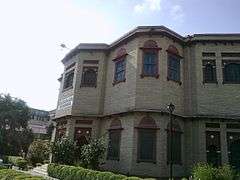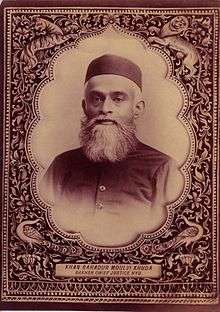Khuda Bakhsh Oriental Library
 | |
| Country | India |
|---|---|
| Type | National library |
| Established | 5 October 1891 |
| Location | Patna, Bihar, India |
| Collection | |
| Items collected | Manuscripts, books, journals, newspapers, magazines, sound and music recordings, patents, databases, maps, stamps, prints, drawings and manuscripts |
| Size |
2,082,904 (printed books) 21,136 (manuscripts) (5,000,000 total items) |
| Legal deposit | Yes, Institution of National Importance by Act of Parliament, 26 December 1969 |
| Access and use | |
| Access requirements | Open to anyone with a genuine need to use the collection |
| Other information | |
| Director | Dr. Imtiaz Ahmad, (since February, 2004) |
| Website | http://kblibrary.bih.nic.in/ |
Khuda Bakhsh Oriental Library (Hindi: ख़ुदा बख़्श मशरिक़ी किताब ख़ाना, Urdu: خدا بخش مشرقی کتب خانہ Khudā Bakhsh Mashriqī Kitāb Khāna) is one of the national libraries of India.[1] It was opened to public on 5 October 1891 by Khan Bahadur Khuda Bakhsh with 4,000 manuscripts, of which he inherited 1,400 from his father Maulvi Mohammed Bakhsh. It is an autonomous organization under Ministry of Culture, Government of India, and is governed by a Board with the Governor of Bihar as its ex officio Chairman, and is known for its rare collection of Persian and Arabic manuscripts. It also hosts paintings made during the Rajput and Mughal eras of India.
It is also a designated 'Manuscript Conservation Centre' (MCC) under the National Mission for Manuscripts.[2]
History

The library finds its origin in private collection of a bibliophile Mohammad Bakhsh and expanded by his son Khuda Bakhsh, who inherited 1,400 manuscripts and continued to add to the collection and eventually converted it into a private library by 1880. The library was opened to public upon its inauguration by Sir Charles Alfred Elliott, Governor of Bengal on 5 October 1891. After partition in 1947, Dr. S.V. Sohoni played a key role in ensuring that the collections were retained in India.[3] In 1969 through a Federal Legislation, an Act of Parliament, namely 'Khuda Bakhsh Oriental Public Library Act' (1969), the Government of India declared Khuda Bakhsh Oriental Public Library a centre of national importance and government took over the funding, maintenance and development of the library. Today it continues to attract scholars from all over the world.[4]
Past directors of the library have been Dr. Abid Reza Bedar, who after remaining with the Raza Library, came as Director to the institution in 1972, and did some important work towards reviving the library along with his successor Habibur Rehman Chighani, at present the Director of the library is the Dr. Imtiaz Ahmad, since February, 2004. It is on its way to become the country's first library to computerize its hand written collection for universal dissemination.[5]
Collection
Some of the notable manuscripts are Timur Nama (Khandan--Timuria), Shah Nama, Padshah Nama, Diwan-e-Hafiz and Safinatul Auliya, carrying the autograph of Mughal Emperors and princes and the book of Military Accounts of Maharaja Ranjit Singh. Apart from it the library also has specimens of Mughal paintings, calligraphy and book decoration and Arabic and Urdu manuscripts, including a page of Quran written on deer skin.[4][6]
There are 21,136 manuscripts in the library of Arabic, Persian, Urdu, Turkish and Pushtu languages.[7]
See also
References
- ↑ "Destinations :: Patna". Archived from the original on 2014-09-18.
- ↑ Manuscript Conservation Centres National Mission for Manuscripts.
- ↑ Godbole, Sanjay (31 March 2002). "Nirapekśa Samśodhaka (निरपेक्ष संशोधक)". Lokasatta (लोकसत्ता) (Mumbai), Lokaraṅga supplement (लोकरंग पुरवणी). p. 3.
- 1 2 "Islamic knowledge house, Khuda Bakhsh Library retains glory". Outlook (magazine). 8 July 2005.
- ↑ "Pride of Patna".
- ↑ "Ahluwalia, wife visit Khuda Bakhsh Library". The Times of India. 19 November 2009.
- ↑ http://www.indiaculture.nic.in/khuda-baksh-oriental-public-library-patna. Missing or empty
|title=(help)
Further reading
- Khuda Buksh, S. (1912). Essays Indian and Islamic. London: Probsthain & Co.
- Salahuddin Khuda Bakhsh and Sir Jadunath Sarkar. Khuda Bakhsh. Patna, 1981.